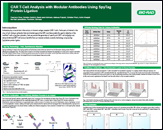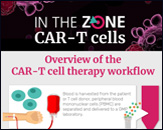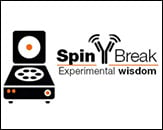Antibodies for CAR-T Cell Therapy Development
-
Monoclonal Generation
-
Custom Recombinant Monoclonal Antibody Generation
-
Webinars, Videos and Technical Articles
- Webinar: Overcome the Challenges of PK Assay Development Using TrailBlazer Antibodies
- Webinar: Generation of SARS-CoV-2 antibodies in multiple formats within four weeks
- Webinar: Recombinant Antibodies with SpyTag Technology
- Webinar: Transform bioanalytical assays with TrailBlazer Antibodies
- Webinar: Control your critical antibody reagents and avoid assay failure
- Webinar: Improve your antibody drug development assays
- Webinar: Optimize your assays using recombinant antibodies selected for desired affinity
- Webinar: The making of recombinant anti-idiotypic antibodies for high performance in bioanalytical assays
- Webinar: Human recombinant antibodies as positive controls and calibrators
- Webinar: How to overcome assay challenges using custom recombinant antibodies
- Webinar: Generation of high affinity recombinant antibodies for application in immuno-MRM
- Video: Generating anti-idiotypic antibodies for bioanalytical assays
- Video: Best practices for characterization and QC of anti-idiotypic antibodies for bioanalysis
- Video: Generation of drug-target complex specific antibodies
- Video: Antibodies for CAR-T cell therapy development
- Article: Monitoring antibody immune responses against biotherapeutic drugs
- Article: Effective tools for drug monitoring assays
- Article: An accelerated approach to sensitive ADA assays
- Article: Isolation of enzyme active site-specific recombinant antibodies by guided selection
- Article: Biomarker Assay Development using Highly Specific Recombinant Antibodies
- Article: Recombinant antibodies as standards for immunodiagnostic assays
- Article: High affinity antibodies for peptide enrichment immuno-MRM
- Article: Generation of antibodies against self-antigens
- Article: Generation and characterization of drug-target complex-specific antibodies
- Article: Antibodies for CAR-T Cell Therapy Development
- Poster: Faster Generation of Anti-Drug Antibodies Using SpyTag Technology
- Poster: CAR T cell analysis with modular antibodies
- Poster: Drug-Target-Complex Specific Antibodies for Pharmacokinetic Analysis of Biotherapeutics
- Poster: Characterization of anti-idiotypic antibodies for high performance in bioanalytical assays
- Poster: Recombinant anti-idiotypic antibodies for antibody drug development
- Poster: Generation of recombinant antibodies for Bio-Plex assays
-
Webinars, Videos and Technical Articles
-
Custom Recombinant Monoclonal Antibody Generation
CAR-T and engineered TCR therapy research and development requires highly specialized antibody reagents. Our custom HuCAL® monoclonal antibody generation services can provide the exact antibodies you need for bioanalysis of cell therapies, T cell enrichment, and immunophenotyping.
- Specificity against the unique determinants of the CAR or TCR
- Desired affinity selected for enrichment or depletion of blood cells
- Monovalent Fab format with choice of tags, ideal for cell enrichment/depletion
- Recombinant production - reliable, consistent quality, easy scale-up
- Antibody sequence available for security and independence
- Antibodies dispatched in as little as 8 weeks
We are experts in the generation of anti-idiotypic antibodies, the highly specialized critical reagent needed to determine the percentage of transfected T cells prior to therapy administration and to differentiate CAR-T cells from other cells in patient samples using flow cytometry.
Talk to our antibody experts to discover how you can get the exact antibodies you need, that work in your hands, and with clear advantages over antibodies generated using traditional methods.
Challenges for the development of CAR-T cell therapies that can be addressed using anti-idiotypic antibodies
CAR-T Cell Therapy Summarized
Chimeric antigen receptor (CAR)-T cell therapy to treat B cell malignancies is one of the current, most successful applications of pioneering technology that enables manipulation of specific immune cell types in order to treat disease.
A chimeric antigen receptor is an engineered fusion protein. The extracellular targeting domain is derived from a single-chain fragment variable (scFv) from a monoclonal antibody, and enables the CAR-T cell to recognize and bind to the antigen on the cancer cell. A hinge or spacer peptide and a transmembrane domain provide the link to the intracellular part. This is made up of one or more domains from T cell receptor intracellular signaling and co-stimulatory molecules, and provides a signal to stimulate T cell activation. Gene transfer technology is used to reprogram T cells taken from a patient or donor to express CARs. Following successful transduction, expansion, and infusion into the patient, these engineered CAR-T cells proliferate and specifically target and induce the killing of tumor cells, with the purpose of controlling and eliminating the cancer.
Development, validation, and implementation of robust and accurate bioanalytical methods are vital to monitor the persistence of CAR-T cells and test their safety and efficacy. During CAR-T cell therapy, the initial dose is low, followed by in vivo cell expansion and decline. Bioanalytical assays need to ascertain whether the transferred cells survive, express the appropriate markers, and expand in vivo. Specificity, selectivity, and sensitivity requirements influence the technology platforms selected, and a secure supply of well-characterized reagents over the lifetime of the study is critical to success.






